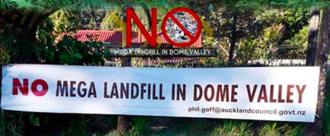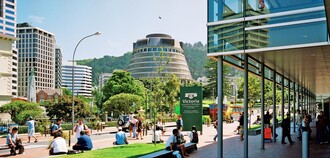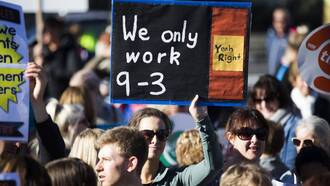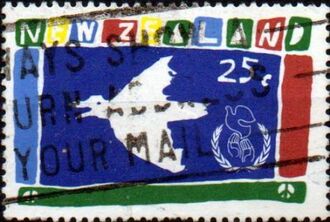-
No Dump in Dome Valley - Protect Kaipara MoanaThe current Dome Valley Landfill Application is focused on meeting the current needs of Auckland City Council’s waste requirements, without regard to Mana Whenua and our special relationship to the Whenua and local community It is the position of Ngāti Whātua that the landfill proposal in its current form will cause irreversible damage to Papatūānuku and pose significant ongoing risks to the sustainability and mauri of the Hoteo River, Kaipara Moana our whenua and the broader environment. We must consider the long-term environmental outcomes, and the first step for protecting the future of the Kaipara Moana is to consider sustainable waste solutions. We ask the Council to halt all discussions with Waste Management NZ and as a Treaty partner provide our Iwi the opportunity to co-create a partnership that will assist our communities to manage waste in a way that puts Papatūānuku and our community at the center of decision making. Ko au te Kaipara - Ko Kaipara Moana ko au Ngāti Whātua ask for national support for this kaupapa and are seeking tautoko/support from all Uri, whānau, hapū, marae and tribal partners to sign our national petition and put forward a submission which closes 11.59pm Tuesday 26th May. To make a submission and to learn more about the Iwi national campaign visit https://www.ngatiwhatua.iwi.nz/dome-valley Listen to locals share their concerns about the pending environmental disaster this proposed dump will bring to the community and the Kaipara Harbour https://www.youtube.com/watch?v=NYklFdyCW0I We acknowledge the efforts of Fight the Tip, Save the Dome who have been fostered strong community opposition https://www.facebook.com/FightWMSavethDome/ National Press Release - Council ignores their obligations to Mana Whenua https://www.scoop.co.nz/stories/AK2005/S00530/auckland-council-ignores-obligations-to-mana-whenua.htm4,588 of 5,000 SignaturesCreated by Te Rūnanga o Ngāti Whātua
-
An Open Letter to save PlaycentrePlaycentre is the embodiment of New Zealand's Early Childhood curriculum, Te Whāriki*. The principles of this bicultural curriculum are: - Family and community - Relationships - Holistic development - Empowerment For many families, Playcentre has supported generations of children to pursue creativity through child-led play. Another key role local Playcentres play is to enabling smooth transitions to schooling and building a sense of community. *https://www.education.govt.nz/assets/Documents/Early-Childhood/Te-Whariki-Early-Childhood-Curriculum-ENG-Web.pdf https://www.newshub.co.nz/home/new-zealand/2020/05/playcentres-threaten-closure-over-lack-of-government-funding.html16,191 of 20,000 SignaturesCreated by Sophie Handford
-
Launch an independent inquiry into residential student accommodation1) Firstly, the legislation that governs residential student accommodation is insufficient, confusing, and unclear. Residential student accommodation is not covered by the Residential Tenancies Act (RTA), meaning that in the case of disputes between residents and their accommodation provider, the option of going to the Tenancy Tribunal is not available to them. Relatively, the power imbalance between a tertiary student and a student accommodation provider is much larger than that between individual tenants and landlords. Because of this, we believe that the lack of option of disputes to be heard by the Tenancy Tribunal is damaging to a students’ access to redress. The Interim Code of Practice for Pastoral Care which was introduced in 2019 also makes no real substantive change. Most of the processes specified already encompass what is going on in halls around New Zealand. This piece of legislation was designed to improve pastoral support and is not sufficient to solve the deeper issues raised here. There needs to be more specific legislation governing halls of residence to ensure the safety of students who reside there. The lack of central government regulation creates inconsistent approaches within the system of residential student accommodation. This is not only apparent in different managements of accommodation within a single tertiary provider, but also between tertiary providers. 2) Secondly, the purpose and function of residential student accommodation is unclear and inconsistent. The lack of central government legislation to support the delivery of residential student accommodation blurs the purpose of the service; is it to make the tertiary provider a profit, or is it to provide a service to students to support their education? While some tertiary providers operate their residential student accommodation services to not make a profit, other tertiary providers appear to use residential student accommodation for the purpose of money making. Often this is done in partnership with external companies, who own and/or operate the accommodation facilities. The blurred purpose or function of student accommodation is not just limited to halls of residence accommodation for high-school leavers. Irrespective of the type of residential student accommodation (i.e. catered or self-catered accommodation), the overriding purpose and function of residential student accommodation should be the same and should be clear to those using the service. The varying degrees of rental alleviation that residential students across the country received from their accommodation providers during Levels 3 and 4 of the COVID-19 lockdown has sharply highlighted how inconsistent the sector is, and raises questions around who the setup is designed to benefit. 3) Thirdly, student welfare and support within residential student accommodation is limited and inconsistent, for both staff and residents. Student welfare and pastoral care within residential student accommodation is largely delivered by Residential Assistants (RAs). RAs receive very limited remuneration (if any), often work more hours than they are paid for, and despite trying to do their best in difficult situations, receive very limited training or support. This has a flow-on effect to residents, who often do not receive the necessary support to deal with issues that arise. The type of work that RAs do can be equated to the job of a Youth Worker, but without the training and salary. Almost all of their weekly paycheck goes towards paying their accommodation fees, meaning they are left with little money at the end of it, if any at all. Furthermore, an overwhelming proportion of RAs are students themselves, and the burden of responsibility on them to support hundreds of other students through often difficult circumstances, with little to no higher support for themselves, lays bare the harrowing ordeals that these providers put them through. Incidents of sexual harassment in halls of residence, and the lack of pastoral support to students who are struggling with mental health, have demonstrated the inadequacy of ongoing training and support provided to these students placed in positions of pastoral care. Currently, there is little to no legislation protecting RAs. There are also no guidelines for other supports for residents at student accommodations, such as Student Support Coordinators (SSCs). This means that often SSCs are assigned more than one hall, and more than a thousand students. The quality of their work therefore is lowered, as they are stretched out in capacity. We call on the Education and Workforce Select Committee to conduct an independent inquiry into the purpose and operations of residential accommodation in Aotearoa, and the legislation that governs it. This inquiry should be broad in scope, examining the investment and funding models, the cost of accommodation for residents, the legal protections for residents, and support structures for residents.432 of 500 SignaturesCreated by NZ Union of Students' Associations (NZUSA)

-
Make Matariki a public holidayIn May, Prime Minister Jacinda Ardern said that more public holidays is among a number of things the government is “actively considering” to encourage domestic tourism. With many small businesses struggling to keep their doors open, more public holidays to encourage folks to spend their disposable income exploring our beautiful country is a fantastic idea. Matariki is a time to gather with friends and whānau to remember those who have passed, to reflect on the year that has been, and to celebrate new beginnings. If Matariki were made a permanent public holiday, it would provide communities with an opportunity to learn about the Maramataka (Māori lunar calendar), connect with the elements and honour those who have passed away. A public holiday would foster understanding and celebration of Māori knowledge and wisdom and invite us to slow down our busy lives and share kai with the people we love. A recent poll, crowdfunded and commissioned by ActionStation members, has revealed that the majority of people in New Zealand believe Matariki should be a public holiday. Now is the time to make it so. 🌟🌟🌟 LEARN MORE: https://thespinoff.co.nz/politics/13-07-2020/the-people-have-spoken-we-want-a-matariki-public-holiday/35,254 of 40,000 SignaturesCreated by Laura O'Connell-Rapira

-
Call for International Students' Fee RefundsIn response to COVID-19 Alert level 4, Victoria University of Wellington has announced that teaching will recommence online on 28 April 2020, and will continue ONLINE for the remainder of Trimester 1. 1) INTERNATIONAL STUDENTS PAY EXTREMELY EXPENSIVE FEES FOR THE FULL STUDENT EXPERIENCE, NOT ONLINE CLASSES It is unreasonable that the University continues to charge full tuition fees when all courses are being delivered online to the students, especially given the fact that international student tuition fees are extortionate, which is four times higher than the standard tuition fees. 2) ONLINE LEARNING IS LESS EFFECTIVE There is a growing concern amongst students that the online learning methods the University has adapted (due to the pandemic) are NOT as effective, especially when done independently from any form of face-to-face teaching. More specifically, International Students believe that the current online learning approach does not justify international students’ tuition fees. 3) LACK OF ACCESS TO FACILITIES As teaching recommenced online under Alert Level 3 and 2, students are unable to gain the full learning experience due to the lack of access to the University’s physical facilities, especially those enrolled in courses with practical components (such as campus library, studio classes, and laboratory sessions) will miss out on hands-on learning experiences. It is unreasonable for students to pay more than $4000 to study a course that carries out practical components entirely online. 4) LACK OF INTERNATIONAL STUDENTS’ EXPERIENCE IN NEW ZEALAND One of the most crucial factors is International Students also miss out on the international education experience unique to studying abroad as they are unable to interact and build connections with fellow students and academic staff from various backgrounds. 5) 30% FEE SCHOLARSHIP ELIGIBILITY SHOULD BE AMENDED In March, a 30% fee scholarship was offered to students who are studying at a distance in Trimester 1, or who were not able to commence study in Wellington on the first day of classes on 2nd March 2020 due to the travel ban. Since then, the situation has evolved significantly, and current border closures now affect all International Students who are in their home countries and are unable to return to New Zealand. The scholarship offer shows that the University recognise that the International Students are unable to get the full student experience in line with the fees that they have paid because of the restrictions put in place following the COVID-19 pandemic. Hence, it is reasonable to ask that this scholarship be extended to all International Students whose student experience has been impaired due to the crisis. This campaign is led by Victoria University of Wellington International Students' Association (V-ISA) Endorsed by 1) Wellington Singaporean Students' Association (WESSA) 2) Victoria University of Wellington Chinese Students' Association (CSA) 3) Victoria University of Wellington Thai Students' Association (TSA) 4) Myanmar Students' Association at Victoria University of Wellington (MSA) 5) Victoria University of Wellington Japanese Students' Society (JSOC) 6) Wellington Malaysian Students' Organisation (WMSO) 7) Victoria University of Wellington Taiwanese Students' Association (WTSA) 8) Victoria University Sri Lankan and Indian Club (VICSLIC) 9) Vietnamese Students' Association in Wellington (VSAW) More articles at: https://www.stuff.co.nz/national/education/121031270/coronavirus-students-want-refunds-after-universities-move-learning-online https://nzisa.co.nz/2020/04/08/international-student-fees-what-are-we-paying-for/1,100 of 2,000 SignaturesCreated by V-ISA, VUW International Students' Association

-
End Youth HomelessnessDuring Covid-19 young people experiencing homelessness have been at increased risk. There has been no coordinated, or youth specific strategy to provide for the needs of young people, and no housing made available to specifically meet their needs. We know that young people are over-represented in the homeless community, with young Maori, and rainbow youth, disproportionately affected. We know that there is limited safe, secure and suitable accommodation for young people experiencing homelessness. We know that - due to limited resources - Youth Housing services are having to turn hundreds of young people away. Yet, our nation has no youth specific strategy - and has provided limited resources - to meet the needs of some of the most vulnerable members of our community. If you are a young person, and you experience homelessness in New Zealand, your options for finding emergency accommodation are low. If you're 16-17yr's old, your chances get even bleaker. With the gains made during COVID19 for our homeless community we have an opportunity as a nation to end rough sleeping in Aotearoa for ever. However, to end homelessness, we must first End Youth Homelessness. To do this, we need your help. Manaaki Rangatahi call on Aotearoa, and the NZ Government, to join with us to #EndYouthHomelessness. Will you sign the petition and support the call and help us to #EndYouthHomelessness? You can read more about Youth Homelessness here: Youth Homelessness is Hidden Homelessness: https://www.stuff.co.nz/national/116095068/the-hidden-homeless-alarming-child-and-youth-homelessness-in-auckland If we truly want to end homelessness, we need to start here: https://www.noted.co.nz/currently/currently-social-issues/nz-ending-homelessness-starts-with-helping-young-people7,855 of 8,000 SignaturesCreated by Aaron Hendry
-
Say no to doubling teacher registration feesTeachers need to be valued. Yet the proposed change increases fees from $220.80 over three years to $157 yearly which equates to $471, more than doubling current fees. This is outrageous. Lumping teachers with a huge increase in costs does not reflect the amazing work they do and is completely unfair and unjustified. We question where the extra money will be spent and how it will benefit us teachers as individuals? Many teachers spoke out in opposition of the fee increase yet have been ignored. https://teachingcouncil.nz/content/fees-announcement Photo: Ricky Wilson/Stuff31,066 of 35,000 SignaturesCreated by Anna Hamilton
-
TRADE ME – Say No to KWILAKwila/merbau is a rainforest species under threat in West Papua, south east Asia and other parts of the Pacific. Most of it is illegally or unsustainably logged and most certifications for its origins are unreliable. It is sold mainly for decking timber and outdoor furniture on Trade Me. The impact of illegal or unsustainable logging of this species on forests, biodiversity and local communities has been tragic. Kwila grows sparsely across forests and logging destroys the surrounding forest as well as this endangered tree. Communities who live within forests are losing their homes, food basket and resources which have been sustained for more than 60,000 years. Forests containing illegally logged kwila are being replaced palm oil/palm kernel plantations and rice fields. The removal of these forests is contributing to climate chaos. There are alternative decking timbers grown in Aotearoa such as eucalyptus, and composite products for outdoor use which are very hard wearing. In 2011 we had an agreement with your Chief Executive to stop the trading of kwila on your website unless it was FSC or PEFC certificated, which strictly limited the trading. We accepted this agreement a starting point and we were very proud that your organisation was ready to do the right thing. We believed it was a very positive example of how a company could demonstrate ethical trading policies and play a role in reducing illegal rain forest logging. This agreement was honoured until about 4 years ago. In the last two years we have written to TradeMe leadership asking for a meeting to discuss why Trade Me has breached the agreement we made and is now allowing kwila from many sources to be sold on your site. We received no response. We have protested outside TradeMe's Auckland office and have received no response. We believe it is in the interest of Trade Me as an ethical trading site to lead the way on protecting the environment, both for a good reputation and for the benefits that come from cleaning up illegal logging. Therefore this petition asks for immediate action to protect kwila. Please stop this unethical trade on your site. Led by West Papua Action National Network How NZ decking timber choices compound a human rights crisis in West Papua, Jul 9, 2018 - https://thespinoff.co.nz/society/22-02-2019/how-nz-decking-timber-choices-compound-a-human-rights-crisis-in-west-papua/227 of 300 SignaturesCreated by Catherine Delahunty
-
End military funding in Aotearoa New ZealandAotearoa New Zealand is internationally perceived as a safe and independent country. However with all our advantages we could be working much more effectively towards peace and conflict resolution in the world. For a start we spend billions of dollars on military hardware, a lot more than on international peace keeping.[1] In this moment of economic insecurity reeling from the effects of covid-19 $1 billion was given to NZ Air Force hardware.[2] Military funding is unethical and supports corporate profits invested in the deaths of civilians. [3,4] The time is now ripe to reset and change New Zealand’s traditional military position. We ask you to consider making New Zealand Aotearoa a neutral, non-aligned country in order to become a world leader in conflict management and peace development internationally. A change to a neutral, non-military stance would immediately increase our security. We ask that all military funding is redirected to the ends of playing a peace-maker role in the world. This is urgent at a time of growing polarisation and fragile economic and social systems around the world. The funding can resource conversations about New Zealand's past and future role, training for people to gain the skills of conflict management, peace work and international aid. There is also a lot of work we could be resourcing internally, to be able to build towards working internationally to end conflicts with integrity. New Zealand as a nation was founded on colonial principles and based on military force and we have a lot of work to do to as a nation to learn, and share our learnings with other nations with similar colonial pasts. Just as Cuba is renowned for its skilled doctors helping in emergencies, New Zealand could become famous for its peace work. Sign the petition for an end to military funding and investments in peace. 1. NZ military $20b shopping list: Planes, boats, soldiers, satellites and drones https://www.stuff.co.nz/national/politics/113363745/nz-military-20b-shopping-list-planes-boats-soldiers-satellites-and-drones 2. Budget 2020: Defence spending locks in $1bn Air Force upgrade https://www.nzherald.co.nz/nz/news/article.cfm?c_id=1&objectid=12331970 3. US supplied bomb that killed 40 children on Yemen school bus https://www.theguardian.com/world/2018/aug/19/us-supplied-bomb-that-killed-40-children-school-bus-yemen 4. As defense industry prepares for downturn, Lockheed Martin reports strong first quarter https://www.washingtonexaminer.com/policy/defense-national-security/as-defense-industry-prepares-for-downturn-lockheed-martin-reports-strong-first-quarter18 of 100 SignaturesCreated by Kerry Bateman
-
Reclaiming Our Streets: Carless Days and Climate Change ResponsibilityCovid 19 Lockdown has given NZ society an opportunity to reflect on the value of living essentially. We have seen our streets and neighbourhoods become more connected and human friendly. We have seen what it is to live without the consistent noise and pollution of traffic and we, in the main, have found a measure of peace, connection and re-orientation in challenging times. This collective experience however is yet to translate to a collective conversation around our use of vehicles. This is an opportunity to reorient our streets and lives to focus on the essentials and clean up our air and our streets by giving them all regular periods of rest eg a return to carless days, car-pooling/sharing, a carless week/weekend each month and a clear reflection upon essential use of our own personal vehicles as well as those for commercial use. Each of us can then start to meet the need for climate change responsibility. Please sign for responsible use of vehicles and repurposing our streets for safe and enjoyable human usage. This is an outreach to local and central government. Please see below for articles on this idea: https://www.unenvironment.org/news-and-stories/story/world-car-free-day-22-september-great-opportunity-reduce-air-pollution and: https://www.weforum.org/agenda/2018/08/air-pollution-opportunity-not-just-problem/43 of 100 SignaturesCreated by Michael Owen
-
BEES ON THE BEEHIVEWe all want a sustainable planet. We all want our planet to survive. We all need bees to thrive to be able to achieve that. We all need to learn to think like worker bees and discover how to unite together in the common good for mother nature. Bee workers of the world unite! Bees can be both a bridge and a gateway. As a bridge they can be a way of connecting human and non-human nature and as a gateway they can guide humans to a deeper understanding and connection with urban nature. 🐝 Bees pollinate our flowers, our plants, our flora and fauna and help our natural planet to grow. Bees also work in communities in harmony with each other. However certain species are in danger because of human activities. Imagine a world without bees? No flowers and plants for us to enjoy and consume = no planet. The purpose of this petition is not to Save bees but to draw attention to them through a community approach and that promotes the values of localism as opposed to internationalism. There is huge value in creating a jar of local honey. A local jar with healing properties, rather than transporting goods across the oceans. Aotearoa New Zealand is blessed to have wonderful bees and wonderful honey. Honey is a good export business for NZ companies, though we also need to seek to find a balance and be thinking more locally. We need to think Global and Act Local. We need to consider how best to utilise our large urban corporate buildings, our institutional organisations, with large rooftops that are often neglected. We need to think more like permaculture and how a tree drops its leaves close to its trunk to feed its own roots with its own nutrients so it then requires less energy to grow more leaves. Aotearoa New Zealand is blessed to have a parliament building called the BEEHIVE. Basil Spence is a well known architect around the world. The Beehive government building is also the central hub of decision making for New Zealand's past, present and future. It is therefore perfectly placed to make some global media buzz and noise around this important ecological issue. We ask NZ Parliament to please consult with a NZ Beekeeping authority and local beekeepers association, to carry out a comprehensive assessment of this proposal, with a simple feasibility study. To then invite a suitably qualified beekeeper, selected from a bid put to tender, to place one of their hives on top of the Beehive. If this location is not possible due to the well-being of the bees, or due to any other logistical or security restrictions, then to place the hive within the grounds of the Beehive building. The intention is to be able to produce a jar of local honey called 'NZ Parliament Beehive Honey.' To enable Jacinda, our wonderful current Prime Minister or any future prime minster of NZ to don a beekeepers outfit for the media. To extract the honey and donate a gift of local NZ Beehive honey to all Prime Ministers and other important dignitaries who come to NZ from around the world. Equally to encourage selling local NZ Beehive Parliament Honey online to the local Wellingtonians and visiting international tourists when they are allowed back into our beautiful country after the Covoid-19 border lockdown. Especially if the old NZ Parliament shop has to remain closed for security reasons. We believe this petition and campaign will help to promote the importance of local NZ made produce in NZ and help to publicise the urban beehive industry in a positive way and for it to be a visual community voice for the NZ bee industry. This will in turn help New Zealanders to all protect our beautiful planet and our bees. Kia Kaha, Buzz Buzz, Bee Good. Protecting bees and other pollinators https://www.epa.govt.nz/everyday-environment/animals-and-insects/bees/ NZ Bee species https://teara.govt.nz/en/diagram/15740/new-zealands-bee-species https://www.landcareresearch.co.nz/resources/identification/animals/bug-id/what-is-this-bug/bugs-with-legs/6-legs/bees-and-wasps Bees And Wind https://www.theguardian.com/environment/2020/feb/18/bees-may-struggle-in-winds-caused-by-global-warming-study-finds https://www.independent.co.uk/news/radar-reveals-secrets-of-bumble-bees-flight-1104964.html NZ Bees Under Threat https://www.stuff.co.nz/environment/99580630/native-bees--small-solitary-and-under-threat Learn About NZ Bees https://www.nzherald.co.nz/nz/news/article.cfm?c_id=1&objectid=12118917 https://apinz.org.nz/learn-about-bees/ https://www.beesuptop.co.nz https://www.sweetreehoney.co.nz NZ Beekeepers Forums https://www.nzbees.net/forums/ https://www.beehive.org.nz The power of Communities ~ Bee philosophy https://www.commonunityproject.org.nz102 of 200 SignaturesCreated by Toby Clark
-
Put nature at the heart of the COVID-19 recoveryNature is on the verge of collapse. New Zealand has 4000 species in trouble, polluted waterways and a damaged marine environment; only transformative economic and policy decisions can restore and sustain our planet and our people. The rebuilding of our society after the impacts of COVID-19 provides us with a chance to restore our natural environment for both current and future generations.416 of 500 SignaturesCreated by Forest & Bird Youth




.png)








